Court Accepted Anger Management Course

- Guaranteed to meet court requirements
- Works on Phones, Tablets & Laptops
- Lowest online price - Starting at $25
- Immediate enrollment. Instant certificate




1,300+ court requirements met




1,400+ court requirements met

Get Your Court Accepted Certificate Today

Enroll in Seconds
Pick your course, checkout securely, and get instant access.
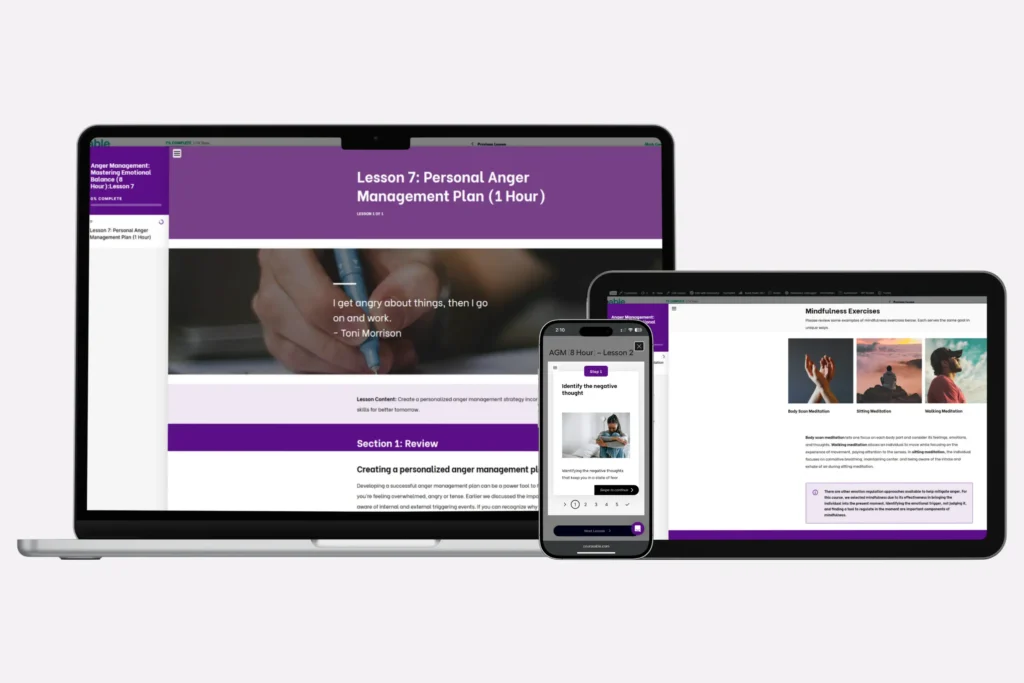
Learn at Your Own Pace on Any Device
Self-paced lessons you can start, stop, and resume anytime.

Download Your Certificate
Your certificate is ready the moment you pass — even sent to your PO or attorney.
Start Here: Choose Your Course

Acceptance Guarantee
Our expert-reviewed curriculum is built to meet court requirements. If your certificate is not accepted for any reason, we guarantee a 100% refund.
Lowest Online Price Guarantee
We ensure the best value. If you find a comparable course of equal duration and quality for a lower price, let us know and we’ll match it immediately.
Mobile Access Guarantee
This course is 100% accessible on smartphones, tablets, and laptops. You can complete the full course, including the final quiz, on any device.
How It Works (5 Easy Steps)






“I took the 8-hour course and I learnt a lot. The course content is very high quality. It’s direct, to the point, and precise. It was also the cheapest 8-hour course I could find online that was court-approved. And best of all, my court accepted the certificate without any issues.”
Danillo

“Course was concise, easy to follow and effective in transmitting the source material into practical knowledge. I highly recommend!!”
Frank

“I took this course for a court requirement, and I went into it with very low expectations. But to my surprise, I found this class to be actually very beneficial as it was packed with really effective strategies. I got my court requirement fullfilled and also improved myself. Thank you!
Michelle

“Learned more than I expected. The anger management course was very thorough. And the online system they have is super easy to use too. I did everything on my phone and had the certificate in under a day. Highly recommend to anyone looking for an Anger class.”
Mike

“Was not sure I actually had an anger issue. But this course has opened my eyes and showed me that I do and it was effecting my relationship with my son. Now I have the skills to improve and save my relationship with my son.”
Janice

“It was a very easy course to follow and allows for you to seamlessly pick up where you leave off. The price is perfect as well!”
Simone

“I thought this was a helpful course because it opened my eyes to things I “thought I knew,” but never gave them the attention that they needed. I was able to take things from this course that I am confident I can apply to my life for immediate and long-term benefit.”
Derek
Meet Your Court Requirement
Start Here: Find The Right Course For You
Endorsed by Court Personnel
Probation Officer

Alexandria Hawkins
Probation Officer, North Carolina
As a probation officer, I often seek effective programs that my clients can enroll in to meet court-ordered requirements without creating additional burdens.
This Courseable course would meet those requirements and has the added bonus of being mobile friendly.
I recommend Courseable without hesitation to anyone who is looking for a court mandated course.
Senior Probation Officer

Jeremy Poole
Probation Officer, New York State
From a law enforcement point of view, this material is thorough, easy to access, and court approved. Additionally, supervision and verification is made easy, as the time spent in the course is tracked. Sections completed, and answers to Reflection Questions can be made available at the request of the judge, probation officer, or attorney.
I highly recommend Courseable, and believe it is a fantastic option for anyone in need of the courses they provide.
Probation Officer

Apprintiss Phelps
Probation Officer, Georgia
As a senior probation officer, I was responsible for guiding individuals through some of the most challenging moments in their lives.
Courseable provides practical, evidence-based content that’s easy to understand and apply.
I confidently recommend Courseable to any agency, officer or client in need of a dependable behavioral education solution.
Meet Your Court Requirement
This Course Is Also Known As
- Anger Awareness Course
- Anger Awareness Program
- Anger Class
- Anger Control Class
- Anger Course
- Anger Issues Class
- Anger Management Class
- Anger Management Education
- Anger Management Program
- Anger Management School
- Anger Management Level 1 Class
- Anger Management Level 2 Class
- Anger Management Seminar
- Anger Management Skills Program
- Anger Management Training
- Anger Management Workshop
- Course for Anger
- Court Ordered Anger Management Class
- Stop Anger Class
- Temper Management Class
Hear What Users Like You Are Saying (Video Testimonials)
Learn Why 1000s of Students Have Trusted Courseable
Our Courses Are Accepted by all U.S. Courts
Our courses are designed to fit the curriculum requirements of all U.S. courts
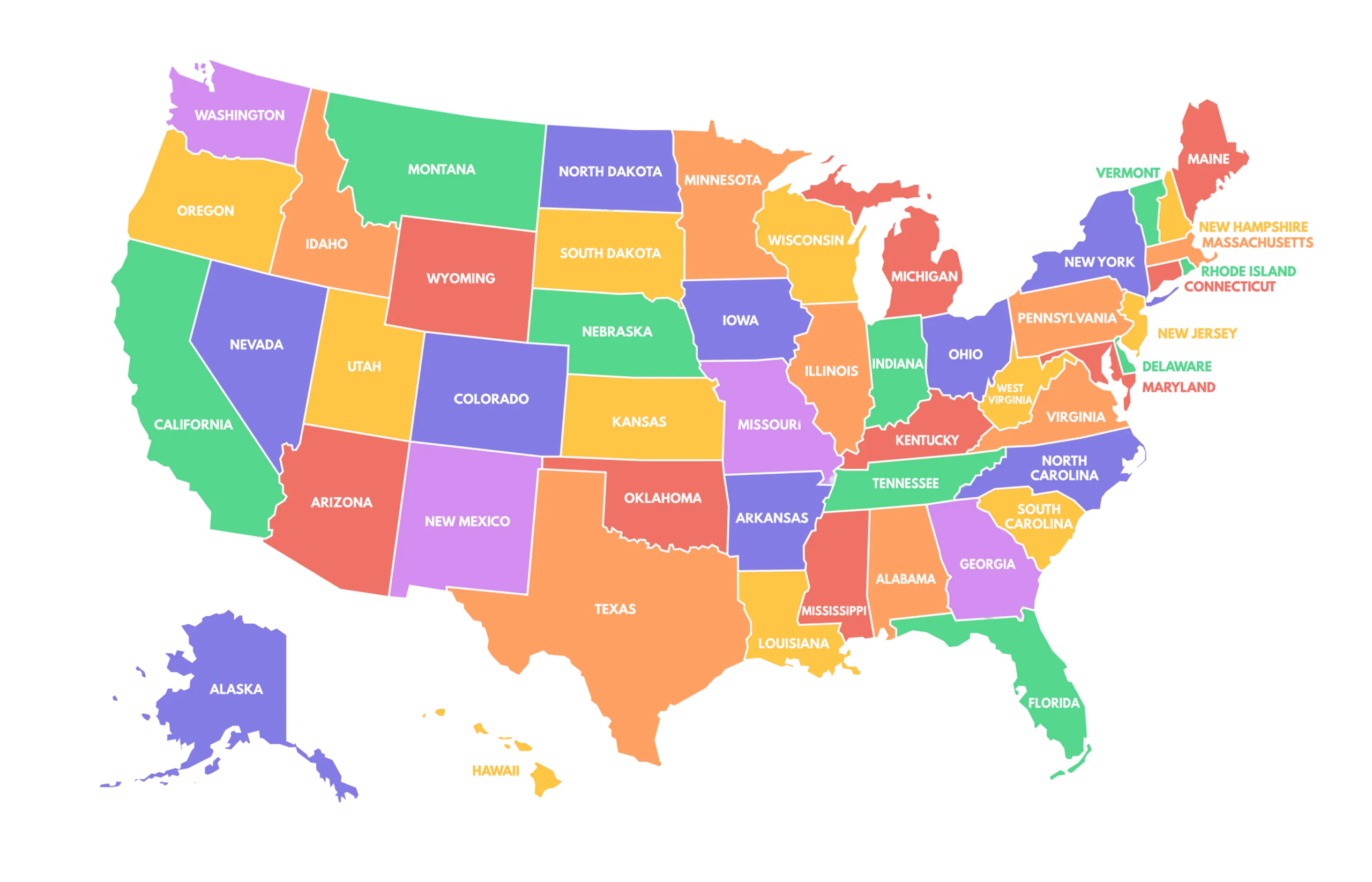
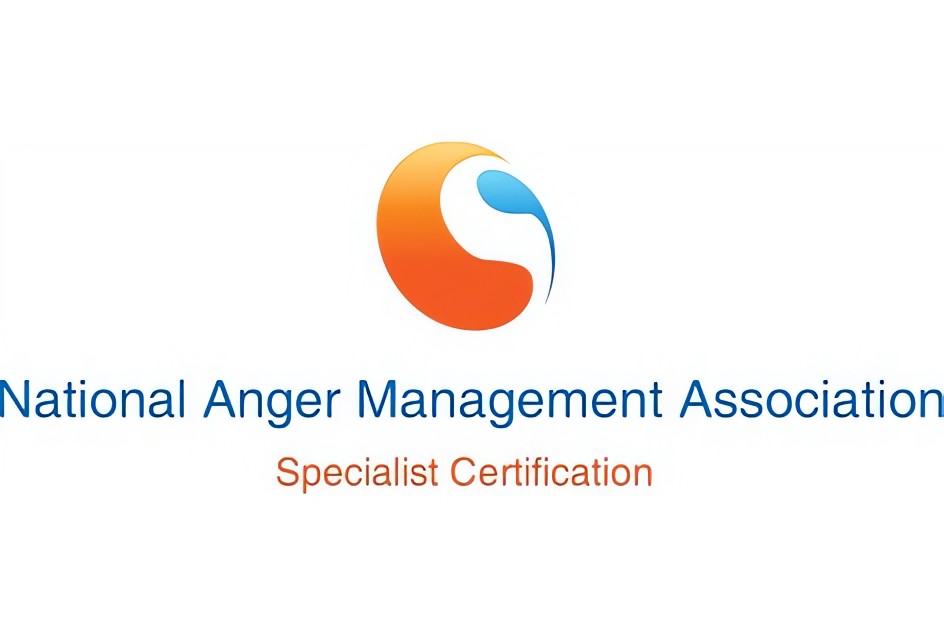
The Curriculum is Created by a Certified Anger Management Specialist
Tiffany Gorham is an anger management expert licensed in cognitive behavioral therapy. She has years of experience helping individuals learn to manage their anger and express it in ways that are healthy and good. She has her Masters of Science from Fresno University.
- MSc. in Counselling, Certified Anger Management Specialist (CAMS)
- Fresno State University, California State University
- 10+ Years of Professional Experience
- Certified Trainer for Mental Health Professionals
You Can Take the Course on Any Device (Phone, Tablet & Laptop)
No app required. No Zoom. Just click and go from your laptop, tablet, or phone.
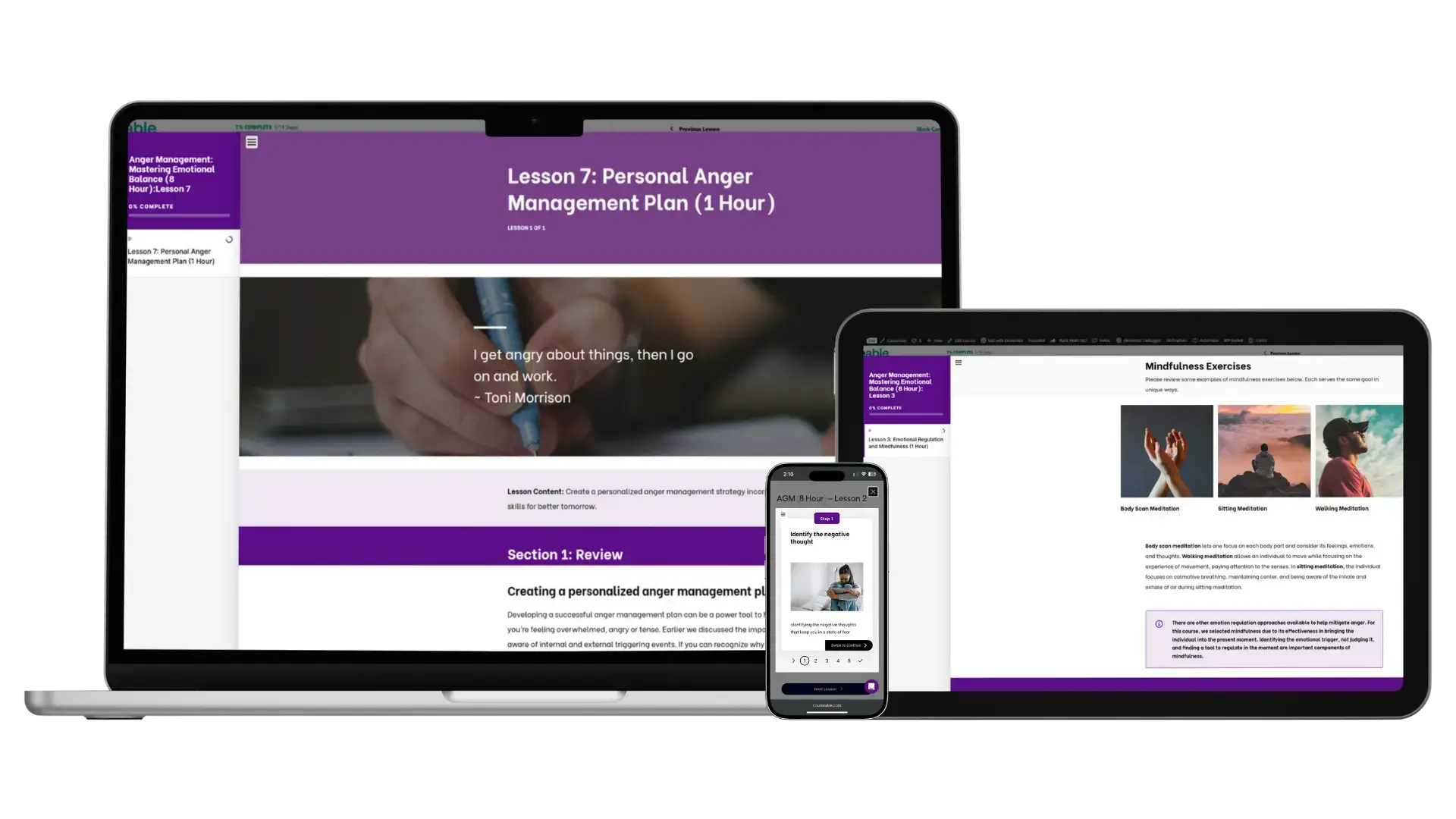

98% of Our Students Pass on the First Try
Practice questions after each lesson makes the final quiz a breeze to pass.
You Can Get Your Official Certificate the Same Day
Download your digital certificate as soon as you complete the course. Each certificate can be verified digitally for authenticity.
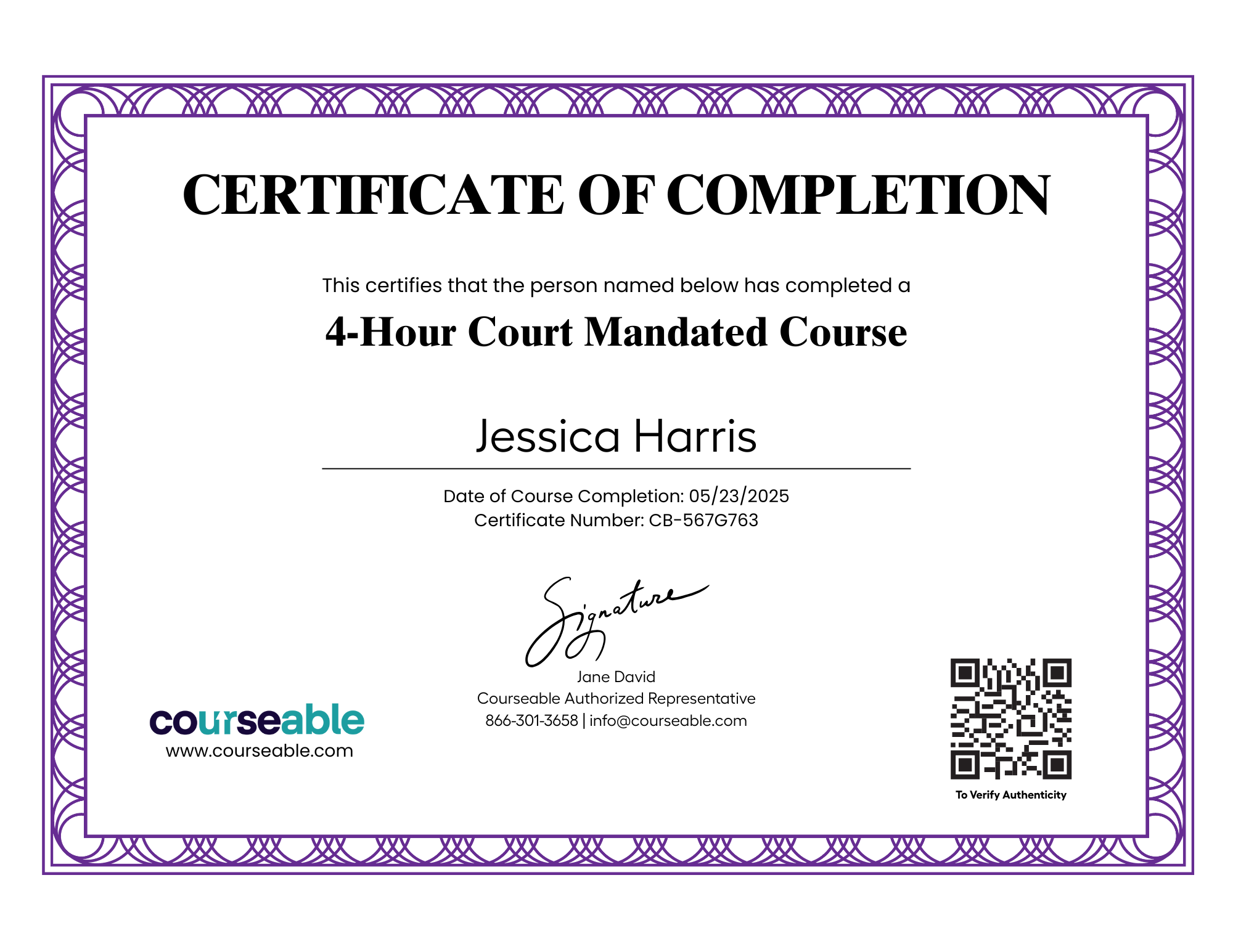
Built With Probation Officers in Mind
Courseable gives you the tools you need to track progress, verify enrollment, and support your parolees with confidence.
- Documentation: Same-day enrollment letter and digital certificate
- Secure: QR code & unique ID certificate verification
- Reporting: Detailed tracking & reports available on request
- Compliance: Expert-built courses that meet court standards
Everything You Need to Know About This Course
Have questions? We’ve got answers!
Yes, they are. The content of the classes has been created by an NAMS-certified anger therapist, based on the Cognitive Behavioral Therapy methodology, and should meet all court requirements. After serving 100s of students, we have a perfect 100% approval rate.
Yes, if for any reason your class certification is not accepted by a court, just let us know and we will 100% of your money back.
Immediately. After you complete your final quiz you will get your certificate immediately. We will also send your certificate to your Attorney, Probation Officer or Court (optional based on your preference)
Yes, after you sign up and complete the intake form you’ll be given an enrollment letter.
Yes, you can access the courses in Courseable from any device. No app or download is required.
Yes, you can take all the courses at your own pace and be issued a certificate of completion when you complete all the materials and quizzes.
If you need help, you can chat with us using the 24X7 chat support, call us or send us an email. Someone from our USA based support team will assist you.
Courseable is the next-generation online education platform providing certified court and self-development classes.
Courseable vs Others Court Courses
Find what sets Courseable apart from the other providers.
Courseable
- Court approved
- Guaranteed acceptance (or your money back)
- Accessible from any device
- Created by certified anger management specialists
- Verifiable certificate and enrollment letter included
- Transparent pricing
Others
- Often rejected
- No money-back guarantee
- Not accessible on phones
- Does not list who created the course
- Certificates and enrollment letters maybe an extra charge
- Hidden fees and upsells
100% Court Approved Curriculum
Each Lesson includes interactive content, resources, worksheets and a knowledge check practice question section.
Lesson 1: Understanding Anger and Its Impact
Explore the foundational concepts of anger, what it is, and its physical and cognitive manifestations. The segment delves into the consequences of chronic, unmanaged anger. Activities involve identifying personal triggers and responses, and reflecting on how thoughts influence anger. A knowledge check reinforces understanding of anger triggers and the nature of unmanaged anger.
Lesson 2: Techniques for Managing Anger
Introduce practical techniques for managing anger, including the ABC Model (Activating event, Beliefs, Consequences) to understand emotional responses. This part covers challenging unhelpful thoughts and common cognitive distortions. Relaxation strategies and behavioral techniques are also touched upon, with activities designed to apply these concepts in real-life scenarios.
Lesson 3: Emotional Regulation and Mindfulness
Develop emotional regulation and mindfulness skills as tools for anger management. This section explains the value of mindfulness in gaining awareness of internal and external states without judgment. Participants will engage in practice exercises, including guided mindfulness meditation and breathing techniques. The importance of self-compassion in managing anger is also highlighted.
Lesson 4: Personal Anger Management Plan
Guide participants in developing a personalized anger management plan. This section revisits effective strategies and provides a framework for setting SMART (Specific, Measurable, Attainable, Realistic, Time-bound) goals. The module also identifies early warning signs of anger and reinforces the importance of self-awareness, emotional regulation, and successful communication traits for managing anger effectively.
Final Test
The final quiz consists of 20 questions covering the content from the lessons you just covered. A score of 75% or more is considered a passing score.
Lesson 1: Understanding Anger and Its Impact
Explore the foundational concepts of anger, what it is, and its physical and cognitive manifestations. The segment delves into the consequences of chronic, unmanaged anger. Activities involve identifying personal triggers and responses, and reflecting on how thoughts influence anger. A knowledge check reinforces understanding of anger triggers and the nature of unmanaged anger.
Lesson 2: Techniques for Managing Anger
Introduce practical techniques for managing anger, including the ABC Model (Activating event, Beliefs, Consequences) to understand emotional responses. This part covers challenging unhelpful thoughts and common cognitive distortions. Relaxation strategies and behavioral techniques are also touched upon, with activities designed to apply these concepts in real-life scenarios.
Lesson 3: Emotional Regulation and Mindfulness
Develop emotional regulation and mindfulness skills as tools for anger management. This section explains the value of mindfulness in gaining awareness of internal and external states without judgment. Participants will engage in practice exercises, including guided mindfulness meditation and breathing techniques. The importance of self-compassion in managing anger is also highlighted.
Lesson 4: Positive Parenting and Family Cohesion
Address anger specifically within the context of parenting and family relationships. Explore positive parenting strategies and the role of boundaries in fostering family cohesion. This segment helps angry parents understand how to respond to children’s upset constructively and encourages positive reinforcement. Activities include exploring personal anger and identifying strategies for coping with it in a family setting.
Lesson 5: Communication and Conflict Resolution
Teach effective communication and conflict resolution skills essential for managing anger in interactions. This part covers active listening, “I” statements, and understanding non-verbal language. Participants will learn how to express themselves assertively during disagreements and analyze conflict situations. Common relapse triggers in anger management and the importance of support systems are also addressed.
Lesson 6: Building Emotional Resilience
Focus on building emotional resilience as a key component of long-term anger management. This section explores the ability to adapt to stress and emotional challenges. Through review questions and scenarios, participants practice applying resilient responses to difficult situations. The module reinforces coping strategies and the importance of self-care practices like journaling, mindfulness, and calmative breathing.
Lesson 7: Personal Anger Management Plan
Guide participants in developing a personalized anger management plan. This section revisits effective strategies and provides a framework for setting SMART (Specific, Measurable, Attainable, Realistic, Time-bound) goals. The module also identifies early warning signs of anger and reinforces the importance of self-awareness, emotional regulation, and successful communication traits for managing anger effectively.
Lesson 8: Path to Success
Concentrate on maintaining progress and preventing relapse in anger management. This final lesson helps participants recognize common relapse triggers, such as high stress, fatigue, and negative environments. The module emphasizes staying accountable through support networks and regular check-ins. It also reinforces the continuous practice of self-care and mindfulness for sustained emotional health and anger recovery.
Final Test
The final quiz consists of 20 questions covering the content from the lessons you just covered. A score of 75% or more is considered a passing score.
Lesson 1: Understanding Anger and Its Impact
Explore the foundational concepts of anger, what it is, and its physical and cognitive manifestations. The segment delves into the consequences of chronic, unmanaged anger. Activities involve identifying personal triggers and responses, and reflecting on how thoughts influence anger. A knowledge check reinforces understanding of anger triggers and the nature of unmanaged anger.
Lesson 2: Understanding the Role of Self-Talk in Anger
Focus is placed on the powerful connection between self-talk and anger. This section explains how negative internal dialogue can intensify angry feelings. Participants will engage in activities that involve identifying and rewriting negative thoughts into more constructive ones. A knowledge check assesses understanding of how self-talk fuels anger and the benefits of positive self-talk.
Lesson 3: The Social and Legal Consequences of Unmanaged Anger
Examine the broad-reaching consequences of unmanaged anger on personal, professional, and legal aspects of life. Through interactive exercises, participants reflect on how anger can damage relationships, impact careers, and lead to legal repercussions. The module emphasizes the importance of recognizing these consequences to encourage healthier anger expression.
Lesson 4: The Brain and Body Connection
Delve into the physiological and neurological aspects of anger. This segment covers how the brain processes anger and the physical responses the body exhibits. Activities encourage self-awareness by prompting participants to recall personal experiences of anger and identify their physical signs. Strategies for calming the brain-body system and transitioning from reacting to responding are also introduced.
Lesson 5: Techniques for Managing Anger
Introduce practical techniques for managing anger, including the ABC Model (Activating event, Beliefs, Consequences) to understand emotional responses. This part covers challenging unhelpful thoughts and common cognitive distortions. Relaxation strategies and behavioral techniques are also touched upon, with activities designed to apply these concepts in real-life scenarios.
Lesson 6: Emotional Regulation and Mindfulness
Develop emotional regulation and mindfulness skills as tools for anger management. This section explains the value of mindfulness in gaining awareness of internal and external states without judgment. Participants will engage in practice exercises, including guided mindfulness meditation and breathing techniques. The importance of self-compassion in managing anger is also highlighted.
Lesson 7: Positive Parenting and Family Cohesion
Address anger specifically within the context of parenting and family relationships. Explore positive parenting strategies and the role of boundaries in fostering family cohesion. This segment helps angry parents understand how to respond to children’s upset constructively and encourages positive reinforcement. Activities include exploring personal anger and identifying strategies for coping with it in a family setting.
Lesson 8: Communication and Conflict Resolution
Teach effective communication and conflict resolution skills essential for managing anger in interactions. This part covers active listening, “I” statements, and understanding non-verbal language. Participants will learn how to express themselves assertively during disagreements and analyze conflict situations. Common relapse triggers in anger management and the importance of support systems are also addressed.
Lesson 9: Building Emotional Resilience
Focus on building emotional resilience as a key component of long-term anger management. This section explores the ability to adapt to stress and emotional challenges. Through review questions and scenarios, participants practice applying resilient responses to difficult situations. The module reinforces coping strategies and the importance of self-care practices like journaling, mindfulness, and calmative breathing.
Lesson 10: Real-Life Practice and Scenario Application
Provide opportunities for participants to apply their learned anger management skills in realistic scenarios. This segment encourages reflection on which strategies are most effective for individual life situations. The module emphasizes moving from theoretical understanding to practical application through open-ended questions about challenging scenarios and confidence in using skills in real life.
Lesson 11: Personal Anger Management Plan
Guide participants in developing a personalized anger management plan. This section revisits effective strategies and provides a framework for setting SMART (Specific, Measurable, Attainable, Realistic, Time-bound) goals. The module also identifies early warning signs of anger and reinforces the importance of self-awareness, emotional regulation, and successful communication traits for managing anger effectively.
Lesson 12: Path to Success
Concentrate on maintaining progress and preventing relapse in anger management. This final lesson helps participants recognize common relapse triggers, such as high stress, fatigue, and negative environments. The module emphasizes staying accountable through support networks and regular check-ins. It also reinforces the continuous practice of self-care and mindfulness for sustained emotional health and anger recovery.
Final Test
The final quiz consists of 20 questions covering the content from the lessons you just covered. A score of 75% or more is considered a passing score.
